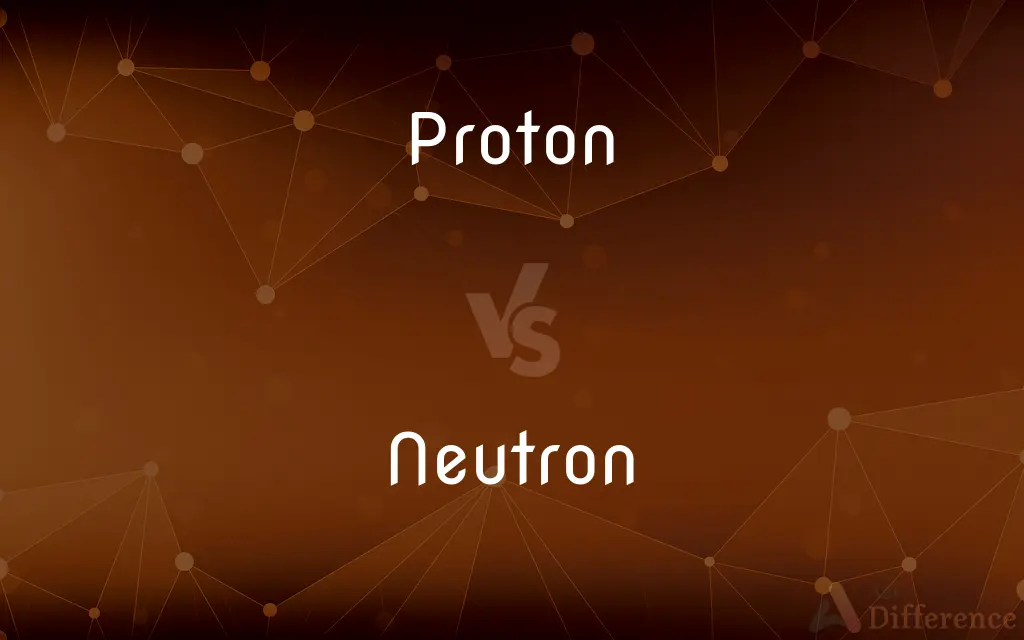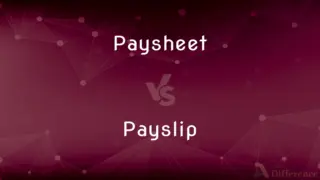Proton vs. Neutron — What's the Difference?
By Tayyaba Rehman & Fiza Rafique — Updated on March 15, 2024
Protons, positively charged particles in an atom's nucleus, define an element's identity, while neutrons, neutral particles, contribute to atomic mass but not charge.

Difference Between Proton and Neutron
Table of Contents
ADVERTISEMENT
Key Differences
Protons are essential components of an atom's nucleus, carrying a positive electric charge. Their number determines the chemical element's identity, as each element on the periodic table corresponds to a unique proton count. For example, hydrogen has one proton, making it the simplest element. On the other hand, neutrons are electrically neutral particles also found in the nucleus. They don't affect the chemical properties of an element but add to the atom's mass. Neutrons play a critical role in stabilizing the nucleus, especially in heavier elements where repulsive forces between protons are stronger.
The mass of protons and neutrons is nearly the same, yet not identical. Protons have a slightly lower mass than neutrons, a difference that is crucial for nuclear reactions, including fusion and fission. While the mass of a proton is about 1.6726 x 10^-27 kilograms, that of a neutron is slightly higher, approximately 1.6749 x 10^-27 kilograms. This slight difference affects the stability and energy of atoms.
Protons determine the atomic number of an element, which is fundamental to its position on the periodic table and its chemical behavior. This atomic number is equal to the number of protons in an atom's nucleus. In contrast, the number of neutrons in an atom contributes to the isotope of that element. Isotopes of an element have the same number of protons but different numbers of neutrons, leading to variations in atomic mass and sometimes in stability.
In terms of interaction, protons within the nucleus are affected by the electromagnetic force due to their positive charge, which repels them from each other. The strong nuclear force, however, overcomes this repulsion at very short distances, binding protons and neutrons together in the nucleus. Neutrons, lacking electric charge, do not experience electromagnetic repulsion, which helps them to act as a nuclear 'glue,' providing stability to the nucleus by mitigating the repulsive forces between protons.
Protons and neutrons are both subject to radioactive decay under certain conditions, transforming from one into another through processes such as beta decay. This transformation alters the balance of protons and neutrons in the nucleus, leading to the transmutation of elements. During beta decay, a neutron can decay into a proton, an electron, and an antineutrino, changing the atomic number and, consequently, the element itself. Conversely, protons are stable in most conditions within atoms but can be transformed in high-energy environments or reactions.
ADVERTISEMENT
Comparison Chart
Charge
Positive (+1e)
Neutral (0)
Mass
Approximately 1.6726 x 10^-27 kilograms
Approximately 1.6749 x 10^-27 kilograms
Role in Atom
Determines atomic number and element's identity
Contributes to atomic mass and stability
Impact on Chemical Properties
Direct (Defines chemical properties)
Indirect (Does not affect chemical properties)
Behavior in Nucleus
Subject to electromagnetic repulsion
Acts as nuclear 'glue' due to lack of charge
Compare with Definitions
Proton
Involved in chemical reactions due to their charge.
Protons influence the way atoms bond with each other.
Neutron
A neutral particle in the nucleus of an atom.
Neutrons contribute to the mass of an atom but not its charge.
Proton
A positively charged particle in an atom's nucleus.
The number of protons defines the atomic number of an element.
Neutron
Acts as a nuclear 'glue.'
Neutrons help to offset the repulsive forces between protons in the nucleus.
Proton
Protons determine the identity of an element.
Carbon atoms have six protons.
Neutron
Neutrons stabilize the atom's nucleus.
Adding neutrons can make an unstable isotope more stable.
Proton
Can undergo transformation in nuclear reactions.
In some reactions, protons can be converted into neutrons.
Neutron
Subject to decay in certain isotopes.
Neutrons can decay into protons through beta decay.
Proton
Affected by the electromagnetic force.
Protons within the nucleus repel each other but are held together by the strong force.
Neutron
Do not participate directly in chemical reactions.
The chemical properties of an element are unaffected by its neutrons.
Proton
A proton is a subatomic particle, symbol p or p+, with a positive electric charge of +1e elementary charge and a mass slightly less than that of a neutron. Protons and neutrons, each with masses of approximately one atomic mass unit, are jointly referred to as "nucleons" (particles present in atomic nuclei).
Neutron
The neutron is a subatomic particle, symbol n or n0, which has a neutral (not positive or negative) charge, and a mass slightly greater than that of a proton. Protons and neutrons constitute the nuclei of atoms.
Proton
The stable, positively charged nucleon, having a mass 1,836 times that of an electron and being a baryon composed of two up quarks and one down quark. The proton is a basic component of all atomic nuclei and the nucleus of the protium isotope of hydrogen.
Neutron
The electrically neutral nucleon, a baryon composed of two down quarks and one up quark, which has a mass 1,839 times that of an electron, is stable when bound in an atomic nucleus, but has a mean lifetime of 886 seconds as a free particle. It is a basic component of all atomic nuclei except the protium isotope of hydrogen.
Proton
(particle) A positively charged subatomic particle forming part of the nucleus of an atom and determining the atomic number of an element, composed of two up quarks and a down quark.
Neutron
(particle) A subatomic particle forming part of the nucleus of an atom and having no charge; it is a combination of an up quark and two down quarks.
Proton
The atomic nucleus of protium hydrogen-1}}
Neutron
An elementary particle with 0 charge and mass about equal to a proton; enters into the structure of the atomic nucleus
Proton
Synonym of primordium
Proton
A stable particle with positive charge equal to the negative charge of an electron
Common Curiosities
What defines an element's identity?
The number of protons in its nucleus.
Can the number of neutrons in an atom vary?
Yes, atoms of the same element can have different numbers of neutrons, resulting in isotopes.
How do isotopes of an element differ?
Isotopes have the same number of protons but different numbers of neutrons.
Do protons affect an atom's chemical properties?
Yes, the number of protons determines the chemical properties and the element's identity.
What is the mass of a proton compared to a neutron?
Protons and neutrons have nearly the same mass, but neutrons are slightly heavier.
How do neutrons affect chemical reactions?
Neutrons do not directly affect chemical properties or reactions due to their lack of charge.
What happens during beta decay?
A neutron decays into a proton, electron, and antineutrino, changing the element.
How do neutrons contribute to an atom's stability?
Neutrons mitigate repulsive forces between protons, adding stability to the nucleus.
Are protons and neutrons affected by the same forces?
Both are affected by the strong nuclear force, but only protons are influenced by electromagnetic forces.
What role do neutrons play in nuclear reactions?
Neutrons can initiate and sustain chain reactions, especially in fission processes.
Can adding neutrons change an element's identity?
No, changing the number of protons, not neutrons, alters an element's identity.
Why are protons considered stable?
Protons have a very long lifetime and are stable in most conditions within an atom.
What is the significance of the strong nuclear force?
It overcomes the repulsive electromagnetic force between protons to hold the nucleus together.
Can protons be transformed into neutrons?
Yes, under certain conditions such as in nuclear reactions or beta decay.
Do protons and neutrons have the same size?
They are similar in size and mass, making up the bulk of an atom's mass.
Share Your Discovery

Previous Comparison
Gazelle vs. Impala
Next Comparison
Paysheet vs. PayslipAuthor Spotlight
Written by
Tayyaba RehmanTayyaba Rehman is a distinguished writer, currently serving as a primary contributor to askdifference.com. As a researcher in semantics and etymology, Tayyaba's passion for the complexity of languages and their distinctions has found a perfect home on the platform. Tayyaba delves into the intricacies of language, distinguishing between commonly confused words and phrases, thereby providing clarity for readers worldwide.
Co-written by
Fiza RafiqueFiza Rafique is a skilled content writer at AskDifference.com, where she meticulously refines and enhances written pieces. Drawing from her vast editorial expertise, Fiza ensures clarity, accuracy, and precision in every article. Passionate about language, she continually seeks to elevate the quality of content for readers worldwide.
















































